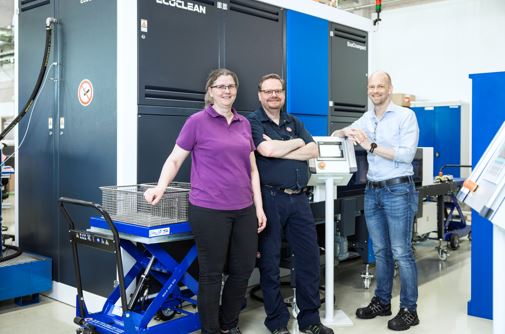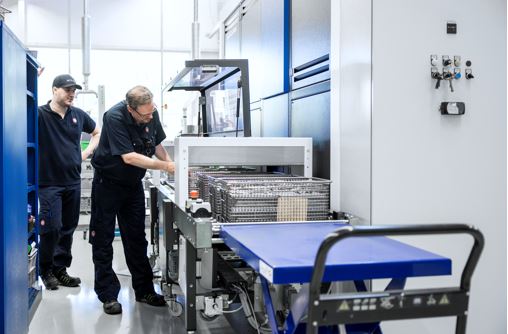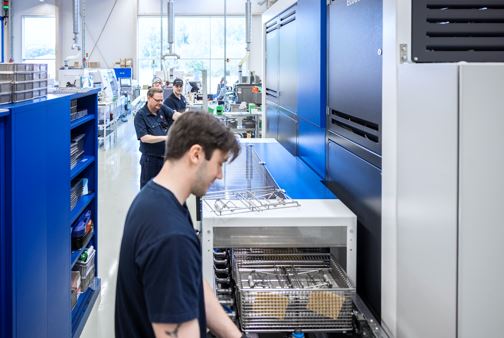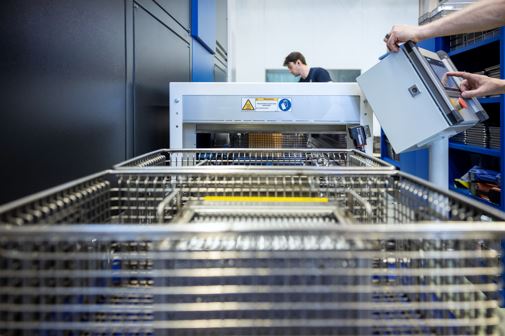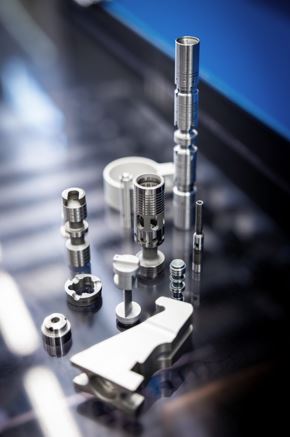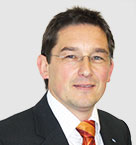High Precision Machined Parts
Solvents for parts made of different materials
Future-oriented parts cleaning
The production of high-precision parts with complex interior geometries requires top quality along the entire production chain. In order to be optimally prepared for future cleanliness requirements, a Swedish manufacturer replaced one of its existing solvent cleaning systems. They chose an Ecoclean EcoCcompact fitted with Ultrasonics PLUS, to mention only one of the system's features.
When company founder Willy Loeffel came from Switzerland to Växjö in Sweden in 1956, he brought entrepreneurial spirit, extensive technical know-how in the operation of sliding spindle lathes and high quality awareness with him. He combined these qualities with the Swedish business culture to create a company which has been setting standards in the industry to this day. The business which is family-run in the second generation specializes in machining of small complex precision products for partly critical applications in the fields of medical and power engineering, valve technology and general industry. Since the beginning Willo has been experiencing in average two digit growth rates in these business fields. This is why its production area will be extended by approx. 1,500 square meters within the next two years with the construction of a new building.
State-of-the-art machinery including innovative measuring technology for constant production monitoring of precision parts made of different steel alloys, aluminium, titan, copper, brass and plastics among others ensures that even tightest tolerances are observed. 'This also concerns parts cleaning where particles and residues of machining oil have to be removed from exterior and interior part contours. On the one hand, the quality of downstream processes such as heat treatment or coating depends on this cleanliness. On the other hand, the observance of defined cleanliness specifications in final cleaning is a must for both potential further processing in validated processes at our customers' and for the function of the parts in the final product', explains Peter Hultkvist, technical manager at Willo.
Higher requirements regarding cleaning quality and process stability
For parts cleaning the company has been using Ecoclean solvent cleaning systems for more than two decades. When the almost 25 years old system was to be replaced, it was clear that the new cleaning system had to meet not only present, but also future cleanliness requirements flexibly and reproducibly. 'It was important for us that we would be optimally prepared for our customers' future higher demands regarding particle and film-type cleanliness specifications, process consistency and productivity. Maximum process stability as well as being prepared for automatic data transfer to our MRP were further requirements', explains Peter Hultkvist. Another criterion was the best possible use of the available production time by optimally selecting the cleaning steps used in the system. They talked about these issues with several cleaning system manufacturers. The fact that they opted for Ecoclean's EcoCcompact was due both to the system concept and its optional features and their good experience with the manufacturer's systems and service as well as advice and support based on their cleaning know-how.
Future-proof investment through high flexibility
The compact solvent cleaning system which only needs 3,200 x 1,600 x 2,450 mm (L x B x H) of space, operates under full vacuum. At Willo's it is used with the hydrocarbons they have been using so far, however it can also easily be operated with modified alcohols (semi-polar solvents) subject to minor modifications. The company opted for a standard machine configuration with three fully integrated flood tanks for the process steps wash, rinse/rinse or preserve.
Depending on type, parts are supplied in bulk or arranged in part carriers and treated in accordance with one of the ten programs stored in the machine control system and which are currently still selected manually. For interfacing with the company's MRP, the machine is equipped with a future-oriented scanner system with integrated software.
Equipped for fine cleaning ...
In accordance with the selected cleaning program, the parts can be degreased with vapour before the actual cleaning process. With this technology, the spent solvent is not piped into the flood tank, contrary to common practice, but directly into the distillation unit integrated as a standard feature. This is done to counteract oil accumulation in the solvent. What is more, vapour-degreasing with wash fluid as final cleaning step is feasible.
... with Ultrasonics PLUS
To ensure reproducible cleanliness results in line with user requirements and increasing demands, the system features the Ultrasonics PLUS option in addition to the standard injection flood wash and ultrasonic processes. In contrast to classical ultrasonic cleaning which takes place under consistent work chamber system pressure, the pressure of the Ultrasonics PLUS process varies and adapts to the part geometry and degree of soiling. Due to these pressure changes, the formation of cavitation bubbles is adapted to the parts requirements so that they also get to interior areas that are not reached with conventional ultrasonic processes. Therefore Ultrasonics PLUS effectively complements classical ultrasonics especially when it comes to parts with complex interior part geometries. Vacuum drying ensures that the parts leaving the machine are completely dry.
Media reconditioning adapted to high cleanliness requirements
The media reconditioning features of the EcoCcompact also contribute to high cleaning quality and process stability. Each tank has a full-flow filtration in the supply and return lines as well as an additional bypass filtration. The combined systems design enables the user to choose filter bags or cartridge filters without having to change the housing. To remove as many chips as possible from the wash fluid after cleaning, bag filters with integrated magnetic separation are mounted in the filtration system of flood tank 1. The other two filtration circuits have cartridge filters which can remove even ultrafine particles from the fluid.
'We have been using the new EcoCcompact since February 2022 and are achieving cleaning results that will surely be meeting our customers' future demands', concludes Peter Hultkvist.
Author: Doris Schulz
